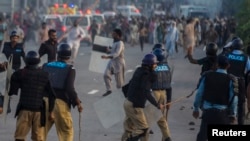Pakistan’s embattled Prime Minister Nawaz Sharif has reiterated he will not step down under pressure from days of mass anti-government protests in the capital that recently have grown violent. An emergency parliament session is set for Tuesday to discuss the political crisis, as protest leaders refuse to leave unless their demands are met.
Thousands of protesters have occupied a central part of Islamabad for more than two weeks, demanding that Sharif resign over alleged election fraud.
They had been mostly peaceful until Saturday when protest leaders called for a march on the nearby building that serves as official home and office for the country’s chief executive.
That move prompted police to fire tear gas and rubber bullets to force the protesters to retreat. The security crackdown left at least three protesters dead, and wounded hundreds of people, including police.
Tensions escalated early Monday when a group of protesters stormed the nearby headquarters of the state television, briefly forcing its broadcast off the air.
The attackers, armed with clubs and many wearing masks, allegedly caused massive damage to the property before Pakistani troops arrived to force them out of the building. Sporadic clashes between protesters and security forces also have continued.
Military role?
Later in the day, Prime Minister Sharif met with leaders of parliamentary parties, including opposition groups not supporting the demonstration, to assure them he will neither resign nor go on leave.
The meeting took place amid a widespread perception that the powerful military is secretly backing the protesters to force Sharif from power.
An army spokesman denied these suggestions on local media, saying it has nothing to do with the political standoff.
However, skeptics like famed Pakistani human rights activist Asma Jehangir say the street protests resemble past actions that led to direct or indirect military interventions in Pakistan.
“I think that what we are going to see in the next few days is going to be a change [in the political setup]. There is no doubt about it. How much the parliamentarians will be able to resist it and whether they will be able to manipulate that change according to their wishes, or whether there will be a complete change according to the wishes of the military, because at this time the protesters are out of the game in the sense that they have done their job,” said Jehangir.
An emergency joint session of the two houses (National Assembly and Senate) of the Pakistani parliament has been summoned for Tuesday to discuss the escalating political crisis. Government officials say a strong message is expected to be delivered through the legislature that “unconstitutional and undemocratic” means will not be allowed to derail democracy in the country.
US urges calm
The United States on Monday urged all sides in Pakistan to refrain from violence, saying protesters have a right to peacefully demonstrate. The U.S. State Department cautioned that Washington strongly opposes “any efforts to impose extra-constitutional change” to the Pakistani political system.
Opposition politician Imran Khan, who leads the third largest political block in parliament, and a fiery anti-government Muslim cleric, Tahir-ul-Qadri, who has a large following in and outside Pakistan, have separately organized the anti-Sharif agitation.
Khan believes last year’s parliamentary elections that brought Sharif and his party to power were massively rigged, and he is demanding a fresh vote.
Khan, a former cricket star, also has repeatedly denied the army or its intelligence units are backing him, insisting his democratic agitation has been peaceful and Saturday's police crackdown on his supporters was "unprovoked."
Qadri wants the dismissal of the prime minister and Pakistan’s democratic system, insisting it is mostly designed to help the corrupt and powerful win elections.
However, most local and international observers say the May 2013 polls in Pakistan were largely credible.












